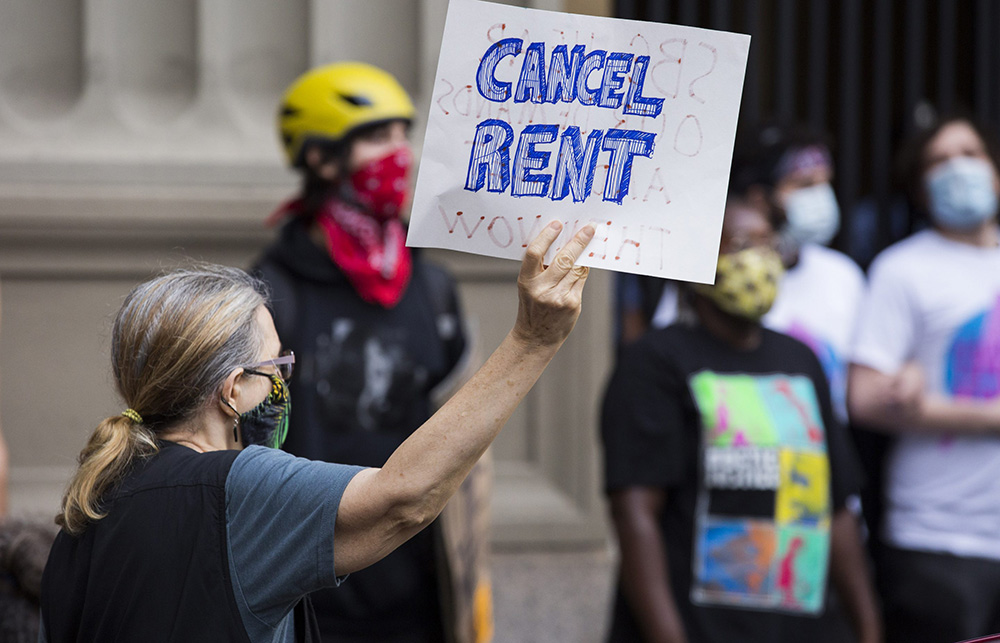
美国一项新签署的暂缓驱逐行政令从9月4日星期五开始生效,进一步保护千百万因为新冠疫情而经济受困的租客免遭驱逐。考虑到居无定所的人群容易感染或传播新冠病毒,此行政令由特朗普政府签署,并通过美国疾病控制与预防中心发布。
这项暂缓令将持续到今年12月31日,为租客提供法律保护。不过,该法令对保护对象列出一定要求,其中一部分要求可能具有主观色彩。以下是大家需要了解的内容。
谁能符合资格?
租客必须满足这五项规定才符合资格:
1. 租客已经尽“最大努力”,首先尝试去获取政府在租金或住房方面提供的所有援助。一些州和城市可能已经开展援助项目,州和地方市政当局也可能已经做出暂缓决定,提供了相同或更高水平的保护方案。在这种情况下,联邦法规将让步于地方法规。
2. 租客的个人预期年收入不得超过9.9万美元,若已经结婚或者夫妻双方在2020年联合纳税申报,则年收入不得超过19.8万美元。租客若没有在2019年被要求提交纳税申报单,或者在今年早些时候收到过《冠状病毒援助、救济和经济安全法案》(CARES Act)发放的纾困支票,则也符合新令资格。
3. 租客因为收入“锐减”、被解雇或不得不支付“巨额”医疗费用,而无法支付全额租金。
4. 除了其他不可自由支配的开支,租客正在尽“最大努力”继续支付尽可能接近全额的租金。
5. 租客“可能”因为被驱逐而无家可归或被迫合住,从而得病或将病毒传播给他人。
这些要求可能具有主观性,因此在租客与房东发生分歧的情况下,管辖住房诉讼的法院法官可能不得不介入,并最终判定租客是否受到这五项规定的“保护”。
该行政令规定,租客必须签署一份声明并将其提交给房东,声明中概述了这五项资格。疾病控制与预防中心表示,这样一来房东就不能合法驱逐租客,否则联邦政府将对房东予以刑事处罚。
房东有何影响?
房东若违反该行政令,但并未因此造成租客死亡,则将被处以不超过10万美元的罚款或一年监禁,或两者兼施。房东若因为驱逐租客而致其身亡,则可能面临25万美元的罚款或一年监禁,或两者兼施。如有组织违令驱逐租客,可能收到20万美元的罚款,若致对方身亡将被罚款50万美元。
假设房东遵守这一行政令,他们仍然可以按照第四条规定让租客尽最大努力支付部分租金,从而收取该部分资金。该行政令亦不禁止房东收取费用或利息,如果租约中有相关条款的话。
只要租客仍然在尽其所能支付部分房租,房东就无法在12月31日之前因为经济原因将其驱逐。不过,房东仍然可以因为其他常见原因而驱客,比如发现其破坏财产或从事犯罪行为。房东可能会利用这一理由在年底前驱逐租客,因此租客应该保持警惕,遵守租约。
该行政令预计将面临法律挑战。房东协会已经在多个州提起诉讼,要求中止此前颁布的新冠疫情相关暂缓令,并声称这些指令违宪。如果这种情况再次发生,法院将做出最终裁定。
租金何时归还?
目前尚不清楚,但很可能在12月31日行政令到期之后,在此期间未付的租金就需要偿还。这项暂缓令并没有给出具体指示,但此观点来自全国低收入住房联盟(National Low Income Housing Coalition),这是一家位于华盛顿的宣传组织。
该组织发表声明称:“虽然暂缓驱逐势在必行,但这只是权宜之计,指令失效之后,欠下的租金还是会把租客推向经济深渊。现在的做法只是推迟了驱逐行动,并不能完全阻止。国会和白宫必须重新谈判,然后通过一项新冠疫情纾困法案,提供至少1000亿美元的紧急租赁援助。”
美国众议院民主党提起的《健康与经济复苏综合紧急解决方案法案》(HEROES Act)也提到了1000亿美元这个数字,这是继《冠状病毒援助、救济和经济安全法案》之后的另一项法案,但国会尚未就此达成一致。(财富中文网0
译者:秦维奇
美国一项新签署的暂缓驱逐行政令从9月4日星期五开始生效,进一步保护千百万因为新冠疫情而经济受困的租客免遭驱逐。考虑到居无定所的人群容易感染或传播新冠病毒,此行政令由特朗普政府签署,并通过美国疾病控制与预防中心发布。
这项暂缓令将持续到今年12月31日,为租客提供法律保护。不过,该法令对保护对象列出一定要求,其中一部分要求可能具有主观色彩。以下是大家需要了解的内容。
谁能符合资格?
租客必须满足这五项规定才符合资格:
1. 租客已经尽“最大努力”,首先尝试去获取政府在租金或住房方面提供的所有援助。一些州和城市可能已经开展援助项目,州和地方市政当局也可能已经做出暂缓决定,提供了相同或更高水平的保护方案。在这种情况下,联邦法规将让步于地方法规。
2. 租客的个人预期年收入不得超过9.9万美元,若已经结婚或者夫妻双方在2020年联合纳税申报,则年收入不得超过19.8万美元。租客若没有在2019年被要求提交纳税申报单,或者在今年早些时候收到过《冠状病毒援助、救济和经济安全法案》(CARES Act)发放的纾困支票,则也符合新令资格。
3. 租客因为收入“锐减”、被解雇或不得不支付“巨额”医疗费用,而无法支付全额租金。
4. 除了其他不可自由支配的开支,租客正在尽“最大努力”继续支付尽可能接近全额的租金。
5. 租客“可能”因为被驱逐而无家可归或被迫合住,从而得病或将病毒传播给他人。
这些要求可能具有主观性,因此在租客与房东发生分歧的情况下,管辖住房诉讼的法院法官可能不得不介入,并最终判定租客是否受到这五项规定的“保护”。
该行政令规定,租客必须签署一份声明并将其提交给房东,声明中概述了这五项资格。疾病控制与预防中心表示,这样一来房东就不能合法驱逐租客,否则联邦政府将对房东予以刑事处罚。
房东有何影响?
房东若违反该行政令,但并未因此造成租客死亡,则将被处以不超过10万美元的罚款或一年监禁,或两者兼施。房东若因为驱逐租客而致其身亡,则可能面临25万美元的罚款或一年监禁,或两者兼施。如有组织违令驱逐租客,可能收到20万美元的罚款,若致对方身亡将被罚款50万美元。
假设房东遵守这一行政令,他们仍然可以按照第四条规定让租客尽最大努力支付部分租金,从而收取该部分资金。该行政令亦不禁止房东收取费用或利息,如果租约中有相关条款的话。
只要租客仍然在尽其所能支付部分房租,房东就无法在12月31日之前因为经济原因将其驱逐。不过,房东仍然可以因为其他常见原因而驱客,比如发现其破坏财产或从事犯罪行为。房东可能会利用这一理由在年底前驱逐租客,因此租客应该保持警惕,遵守租约。
该行政令预计将面临法律挑战。房东协会已经在多个州提起诉讼,要求中止此前颁布的新冠疫情相关暂缓令,并声称这些指令违宪。如果这种情况再次发生,法院将做出最终裁定。
租金何时归还?
目前尚不清楚,但很可能在12月31日行政令到期之后,在此期间未付的租金就需要偿还。这项暂缓令并没有给出具体指示,但此观点来自全国低收入住房联盟(National Low Income Housing Coalition),这是一家位于华盛顿的宣传组织。
该组织发表声明称:“虽然暂缓驱逐势在必行,但这只是权宜之计,指令失效之后,欠下的租金还是会把租客推向经济深渊。现在的做法只是推迟了驱逐行动,并不能完全阻止。国会和白宫必须重新谈判,然后通过一项新冠疫情纾困法案,提供至少1000亿美元的紧急租赁援助。”
美国众议院民主党提起的《健康与经济复苏综合紧急解决方案法案》(HEROES Act)也提到了1000亿美元这个数字,这是继《冠状病毒援助、救济和经济安全法案》之后的另一项法案,但国会尚未就此达成一致。(财富中文网0
译者:秦维奇
Starting Friday, Sept. 4, a new, expanded eviction moratorium will go into effect with the aim of preventing millions of renters from being evicted due to the financial impact of the coronavirus pandemic. Ordered by the Trump Administration, the mandate was issued through the Centers for Disease Control and Prevention, since those without housing stability are high risks to contract or spread the COVID-19 virus.
The moratorium is set to run through Dec. 31 of this year, offering legal protections for renters. But there are certain requirements that must be met to qualify, some of which could be subjective. Here's what you need to know.
Who is eligible?
A renter must meet five stipulations to be eligible:
1.They have used their "best efforts" to first obtain all available government assistance for rent or housing. Some states and cities might have assistance programs already in place. State and local municipalities might also already have a moratorium in place providing the same or better level protection, in which case the local rules would apply over the federal one.
2.They expect to make no more than $99,000 in income as an individual or $198,000 if married or filing a joint tax return in the 2020 calendar year. They can also qualify if they were not required to file a tax return in 2019 or received a stimulus check as part of the CARES Act earlier this year.
3.They are unable to pay the full amount of rent due to experiencing a "substantial" loss of income, or because they were laid off or had to pay "extraordinary" medical expenses.
4.They are using their "best efforts" to continue making at least partial rent payments as close to the full amount as possible, taking into account other nondiscretionary expenses.
5.Eviction would "likely" make them either homeless or force them to move into a shared living situation, where they could get sick or spread the virus to others.
These requirements can be subjective, though, so in the case of disagreement with a landlord, a housing court judge may have to step in to make the final decision on whether a renter is "covered" under the five provisions or not.
The order states that renters must sign a declaration—found here in this document—outlining these five qualifications, and present it to the landlord. The CDC says a landlord would then not be legally allowed to evict the tenant, or the federal government then impose criminal penalties on the landlord.
What does this mean for landlords?
Landlords violating the order would be subject to a fine of no more than $100,000, a year in jail, or both, if the violation does not lead to death of a renter. If the eviction did lead to a death of a renter, the fine could increase to $250,000, or the year in jail, or both. Organizations that commit this violation could receive a $200,000 fine if it doesn't result in death, or $500,000 if it does.
Assuming the landlord does not ignore the order, they can still collect some rent as outlined under fourth provision for renters pledging to make best efforts to pay at least partial the amount of rent. The order also does not prevent landlords from charging fees or accruing interest, if those are included under the renter's lease.
As long as renters are still making partial payments to the best of their ability, landlords can't evict tenants before Dec. 31 for financial reasons. But landlords still could evict a renter for other usual reasons, like the destruction of property or criminal behavior. It's possible landlords will attempt to use this reasoning to proceed with an eviction before the end of the year, so tenants should stay vigilant in terms of following the rules of their lease.
The order is expected to face legal challenges. Landlord associations have sued in multiple states to halt previous COVID-19-related moratoriums, claiming they are unconstitutional. If this happens again, the final decision will come down to the courts.
When will the rent be due?
It's unclear, but it's likely that back rent unpaid over the course of the moratorium would be due once the order expires on Dec. 31. The moratorium doesn't offer specific instructions on what will happen, but this is the view of the National Low Income Housing Coalition, an advocacy group based in Washington, D.C.
"[W]hile an eviction moratorium is an essential step, it is a half-measure that extends a financial cliff for renters to fall off of when the moratorium expires and back rent is owed," the group said in a statement. "This action delays but does not prevent evictions. Congress and the White House must get back to work on negotiations to enact a COVID-19 relief bill with at least $100 billion in emergency rental assistance."
The $100 billion figure was included in the House Democrats-sponsored HEROES Act, a follow-up to the CARES Act, but Congress has not yet reached an agreement.on.






